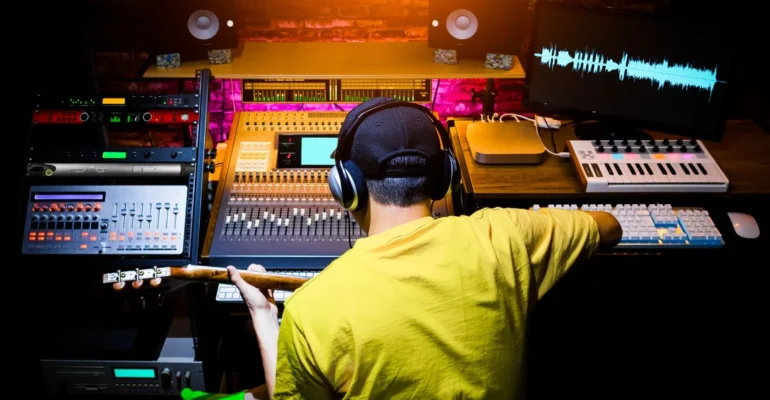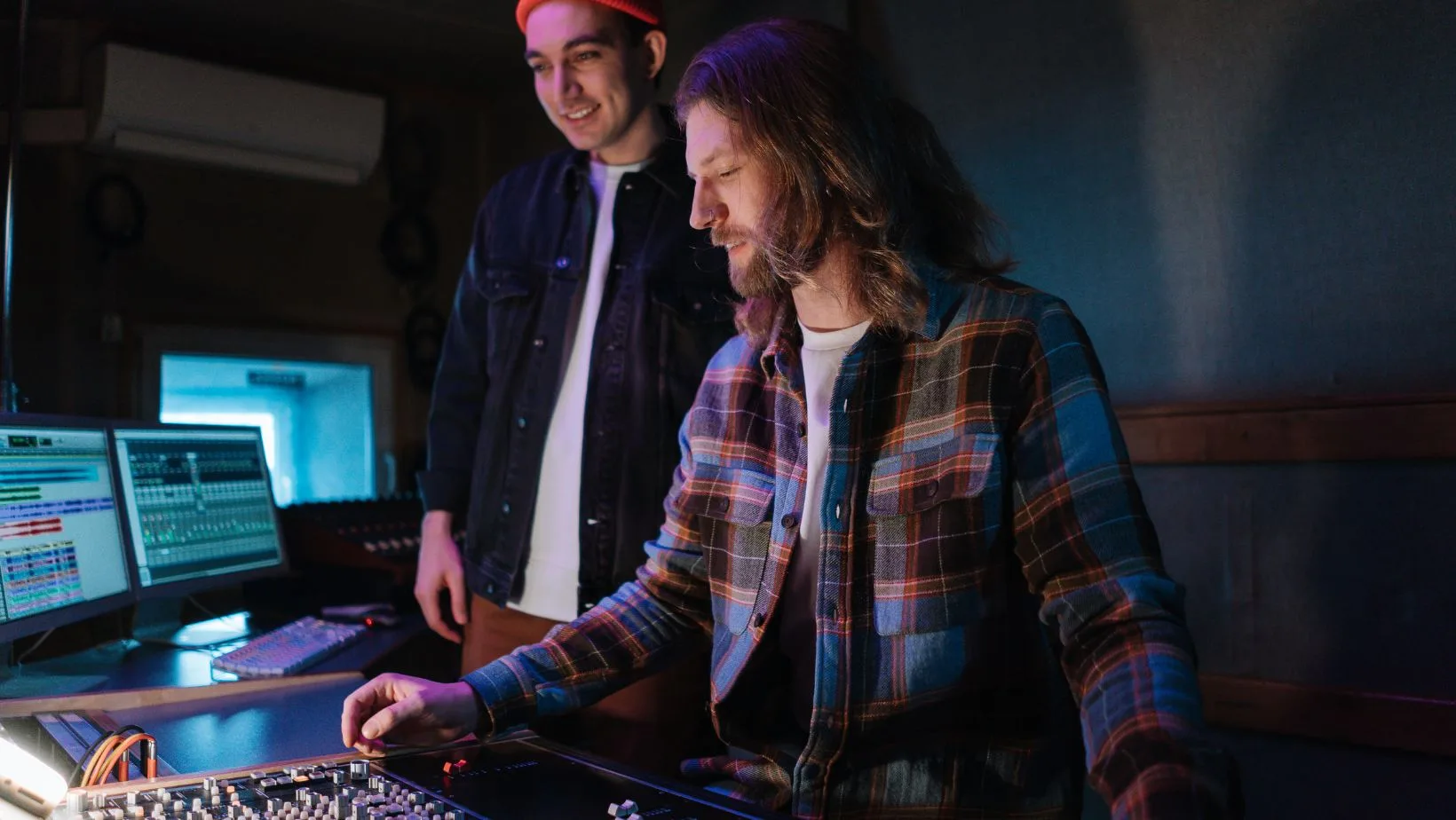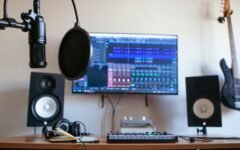The Impact of Technology on Music Production
October 9, 2023 2024-05-14 10:43The Impact of Technology on Music Production

The Impact of Technology on Music Production
The Impact of Technology on Music Production
Music production has come a long way since the days of analog recording in soundproof studios with massive mixing consoles and reel-to-reel tape machines. The advent of technology has revolutionized every aspect of the music industry, from composition and recording to distribution and consumption. In this article, we will explore the profound impact of technology on music production, tracing its evolution, discussing its current state, and looking ahead to future trends.

Historical Perspective
To understand the impact of technology on music production, it’s essential to take a step back in time. The music industry has a rich history, and technology has played a pivotal role in shaping its evolution.
Analog Era: Music production in the early 20th century relied heavily on analog equipment. Musicians recorded onto tape machines, and mixing involved physical manipulation of audio tracks. This era was characterized by a warm, organic sound, but it was also limited by the constraints of physical media and equipment.
The Birth of Digital: The 1970s and 1980s saw the emergence of digital technology in music production. The introduction of Digital Audio Workstations (DAWs) revolutionized the process, allowing for precise editing, MIDI sequencing, and digital mixing. This shift marked the beginning of a significant transformation in music production.
Digital Revolution
The digital age brought about a seismic shift in the music production landscape. It not only changed the way music was recorded and produced but also democratized the process, making it accessible to a broader range of artists.
The Power of DAWs: DAWs are the cornerstone of modern music production. Software like Pro Tools, Logic Pro, and Ableton Live have become the industry standard for recording, editing, and mixing music. They offer a versatile and intuitive platform for musicians and producers, allowing them to experiment with sounds and arrangements easily.
Virtual Instruments: Virtual instruments and software synthesizers have opened up endless creative possibilities. Musicians can now access realistic emulations of traditional instruments and experiment with a vast array of virtual sounds. This technology has expanded the sonic palette available to artists, enabling them to push the boundaries of music genres.
The Role of Software
In the digital age, software tools have become indispensable in music production. They provide musicians and producers with the means to shape and manipulate sound in ways that were once unimaginable.
Recording Software: Recording software has evolved to the point where high-quality recordings can be made in home studios with minimal equipment. Musicians can capture their performances and ideas with ease, whether they are working in a professional studio or their bedroom.
Editing and Mixing Tools: Software for editing and mixing has empowered producers to fine-tune every aspect of a track. From adjusting the timing and pitch of vocals to sculpting the perfect EQ balance, these tools offer unparalleled control over the final sound.
Automation and AI
Automation and Artificial Intelligence (AI) are transforming the music production process. These technologies streamline workflows, enhance creativity, and even assist in the composition of music.
Automating Workflows: Automation allows producers to automate repetitive tasks, such as volume adjustments, panning, and effects. This not only speeds up the production process but also ensures precision in every mix.
AI in Music Composition: AI-driven tools are capable of composing music based on predefined parameters. While they cannot replace the creativity of human composers, they can generate musical ideas and assist in the composition process. AI’s ability to analyze vast amounts of musical data also offers new insights and inspiration to artists.
Accessibility and Collaboration
One of the most significant impacts of technology on music production is the democratization of the industry. Technology has made music production more accessible to aspiring musicians and has fostered collaboration on a global scale.
Home Studios: In the past, setting up a recording studio required substantial investments in equipment and studio space. Today, technology has made it possible for musicians to create high-quality recordings in their homes. Affordable DAWs, microphones, and soundproofing solutions have empowered artists to take control of their music production.
Remote Collaboration: The internet has made it easier than ever for musicians and producers to collaborate across distances. Artists from different corners of the globe can work together seamlessly, sharing files, ideas, and inspiration online. This has led to the creation of diverse and innovative music projects that transcend geographical boundaries.
Challenges and Future Trends
While technology has brought numerous advantages to music production, it also poses challenges and raises questions about the future of the industry.
Overcoming Technical Challenges: With the vast array of technology available, musicians and producers must navigate a steep learning curve. Technical challenges can be intimidating, but the payoff in terms of creative freedom and control over the final product is significant.
Future of Music Tech: The world of music technology continues to evolve rapidly. Emerging trends include the use of virtual reality (VR) and augmented reality (AR) in music experiences, blockchain technology for transparent royalty distribution, and AI-driven music recommendation systems. The future holds exciting possibilities for both creators and consumers of music.
Conclusion
In conclusion, the impact of technology on music production is nothing short of revolutionary. From the analog era to the digital age, technology has transformed the way music is created, recorded, and shared. Digital Audio Workstations, virtual instruments, and automation tools have empowered musicians and producers, while the democratization of music production has opened doors for artists worldwide.
As technology continues to advance, the possibilities for music production are limitless. Musicians and producers have more tools at their disposal than ever before, and the fusion of technology and creativity promises a bright future for the music industry. Whether you’re an aspiring artist recording in your bedroom studio or a seasoned producer experimenting with AI-driven compositions, technology is your ally in the journey of making music that resonates with the world.
If you are looking for a Music Production course, Angel’s Music Academy offers a range of diploma and degree programs in Music Production.
Related Posts
Build a Home Recording Studio on a Budget
Music Production Degree
Music Production Studio in Jaipur
How to write and produce your own music
Search
Categories





